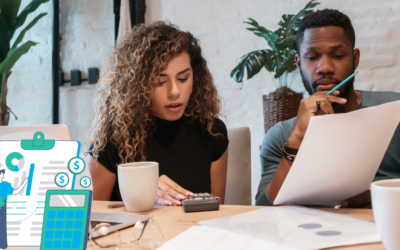Purchasing your first home is an exciting and significant milestone in life. Hammering a picture up on the wall without any guilt or getting to revamp a bathroom based on your style are all part of the perks of owning your home. However, saving up for a down payment and budgeting properly can be quite daunting, especially in an often turbulent economy like South Africa’s. Fortunately, with careful planning and disciplined financial habits, you can make your dream of homeownership a reality. To make the journey of budgeting and purchasing your first home a little easier, we’ve put together a guide on everything you’ll need to know when you start budgeting for your first home.
8 tips for budgeting for your first home in South Africa
1. Set Clear Goals
Before embarking on your homeownership journey, it’s crucial to define your home budget and financial goals. Determine how much you want to save for a down payment, establish a realistic timeframe, and consider any other expenses associated with purchasing a home, such as legal fees, property taxes, and moving costs. Setting clear goals will help you stay motivated and focused throughout the saving process.
2. Assess Your Finances
Take a comprehensive look at your current financial situation to understand your income, expenses, and existing debts. If you need to sort out your debt dilemma, then put a game plan in place to tackle this asap before you even think about creating a budget. Create a budget that encompasses all your monthly expenses, including rent, utilities, groceries, transportation, and entertainment. This exercise will give you a clear picture of your cash inflows and outflows, enabling you to identify areas where you can cut back and save more.
3. Create a Realistic Budget
A well-crafted budget is the foundation of successful saving. Allocate a specific portion of your income toward savings each month. Consider adopting the 50/30/20 rule: allocate 50% of your income to essentials (housing, utilities, transportation), 30% to discretionary spending (entertainment, dining out), and at least 20% to savings. Adjust these percentages based on your priorities and financial circumstances. Use budgeting apps or spreadsheets to track your expenses and stay on top of your financial progress.
4. Minimize Expenses and Increase Income
To accelerate your savings, it’s essential to find ways to minimize expenses and increase your income. Consider cutting back on non-essential spending, such as eating out or subscription services. Evaluate your utility bills and insurance premiums to ensure you’re getting the best deals. Additionally, explore ways to boost your income, such as taking up a side gig or freelancing opportunities. Every little bit counts when it comes to saving for your first home.
5. Automate Your Savings
Make saving a seamless and consistent process by setting up automatic transfers from your checking account to a dedicated savings account. This way, you won’t be tempted to spend the money earmarked for your down payment. Prioritize building an emergency fund alongside your down payment savings to ensure you have a safety net in case of unexpected expenses.
6. Explore Government Assistance Programs
In South Africa, there are various government assistance programs aimed at helping first-time homebuyers. The Help Me Buy a Home program is part of the FLISP (Finance Linked Individual Subsidy Program), which provides a subsidy for low- to middle-income earners to assist with purchasing their first home. Understand the eligibility criteria, application process, and benefits these programs offer to determine if they align with your goals.
7. Educate Yourself on Homeownership Costs
Beyond the down payment, it’s crucial to understand the ongoing costs associated with homeownership. Account for expenses like property taxes, homeowners’ insurance, maintenance, and utility bills. Consider attending first-time homebuyer workshops or seeking advice from professionals to gain insights into the long-term financial commitments of owning a home.
8. Look into a home loan
Looking into a home loan is a practical way to budget for your first home. By assessing your financial situation and researching different lenders, you can find a loan product that suits your needs. When purchasing a home, most buyers will need to put down a deposit in the range of 10-20% of the sale price. The lender typically provides financing for the remainder of the purchase, provided that you qualify for a loan. So, you’ll need to calculate your affordability by considering your income, existing debts, and monthly expenses. Explore various lenders to find competitive interest rates, favourable terms, and flexible repayment options. A home loan allows you to purchase a property sooner by providing the necessary funds, while spreading out the cost over a longer period. However, it’s crucial to carefully consider your repayment capabilities to ensure that the loan fits within your budget. By utilizing a home loan, you can achieve homeownership while managing your finances effectively. If you’d rather go the route of applying for a personal loan that can be used towards your house, then compare offers from Fincheck and make sure you find the right finance suited to your needs.
Saving for your first home requires discipline, commitment, and a well-structured budget. By setting clear goals, assessing your finances, and implementing smart saving strategies, you can make steady progress towards owning your dream home. Remember to stay focused, remain flexible, and celebrate milestones along the way. With proper budget






